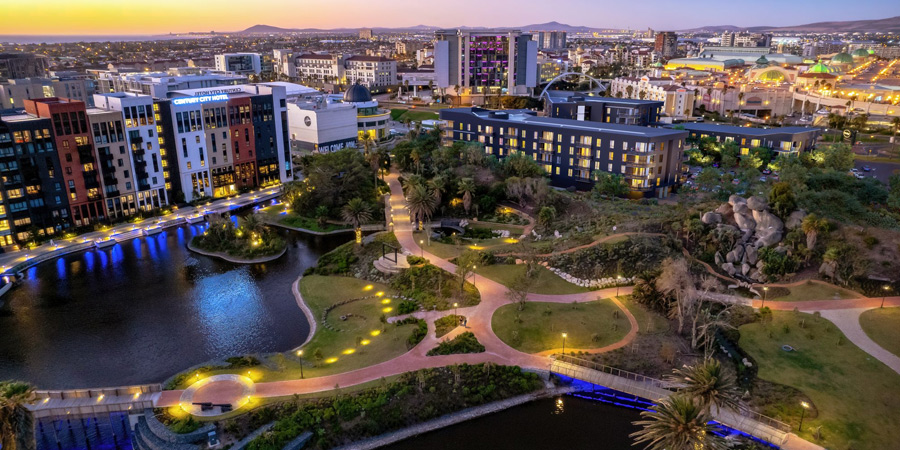In recent years, the African continent has been quietly but resolutely advancing a new narrative in urban growth—one where Smart Cities are no longer just futuristic buzzwords, but practical, tangible transformations unfolding across the continent. Equipped with sensors, big‑data, artificial intelligence and renewable energy systems, cities from Lagos to Kigali are leveraging technology to reshape how people live, move, work and play.
Table of Contents

Blueprint of Progress: Home‑grown Innovation and Bold Visions
Take Lagos for instance—the city that almost laughed at traffic jams, until technology started turning the tide. The implementation of intelligent traffic lights, real‑time traffic monitoring and data analytics is already easing the once‑chaotic flow of cars and reducing harmful emissions. These interventions demonstrate just how Smart Cities are enhancing urban mobility in ways that reflect Nigerians’ everyday needs.
In Kenya, Smart Cities are emerging in earnest, most notably in Konza Technopolis—dubbed “Silicon Savannah”. With strong backing from the Kenyan and South Korean governments, it’s fast becoming a bustling tech hub. In 2024 alone, major milestones included the launch of an integrated operations control centre, smart mobility plans and a kick‑off to the Konza‑Nairobi transport corridor project—a sure sign that tech‑driven urban life is not just talk.
Meanwhile, Rwanda is setting benchmarks of its own. Vision City, Kigali’s largest smart residential development, is rapidly rolling out IoT‑enabled waste management, solar power for every home, intelligent lighting and even AI‑assisted surveillance across public spaces—all aiming for completion by 2025.
Real‑Time Services: Water, Waste, Governance, and Traffic
Cape Town, South Africa, is another Smart Cities success story. When drought threatened, smart water meters were deployed to track usage, alert to leaks, and optimise distribution dynamically. Meanwhile, data‑driven sensors across the city help manage electricity, waste levels, street lighting, traffic flow—and even detect gunshots in high‑risk areas.
Elsewhere, Nairobi has introduced digital payment systems for public transport, bike‑sharing and plans for a Bus Rapid Transit (BRT) system with real‑time ticketing and route data. Such developments offer relief to commuters and are nudging African cities toward truly Smart Cities models—ones built around citizens’ daily routines.
Purpose‑Built Cities: The New Frontier of Urban Planning
Across Africa, there’s also a growing trend of building entire cities from scratch to embody the Smart Cities ethos. Centenary City, near Abuja, is one such project: conceived in 2014 to mark Nigeria’s 100 years of nationhood, this master‑planned enclave will host a financial district, residential estates, educational institutions, healthcare, recreation, museums and even a safari park—all tied together under a Free Trade Zone model.
According to AP News, another example is Tatu City on the outskirts of Nairobi. A privately owned “startup city”, the sprawling development on 5,000 acres has drawn businesses, investors and already hosts thousands of residents. Built with a special economic zone status, it aims to balance infrastructure, governance and inclusivity—even as planners remain cautious about the risks of exacerbating inequality.

Ambitious Visions with Global Flair
Let’s not forget international star power. Actor Idris Elba, teaming with Sierra Leonean partners, is reportedly laying out his own blueprint for a new Smart Cities narrative. On Sherbro Island, he envisions a smart, eco‑friendly city powered by wind and solar—backed by notable partners like Octopus Energy and Lloyds. Though the timeline remains vague, and financing remains a formidable challenge, the dream is to offer a symbol of African resilience, self‑reliance and sustainable growth.
Hurdles on the Road to Smart Urban Futures
Of course, building Smart Cities in Africa is not without its teething problems. Across the board—from Freetown to Johannesburg—urban planners and authorities confront infrastructure deficits, massive funding shortages, uneven digital access and institutional capacity gaps.
Moreover, there’s a very real risk that such developments could deepen social inequality. In Africa, where millions still lack reliable internet or face high costs for data, the promise of technology‑driven cities risks bypassing those who need it most.
Different projects take different approaches to these challenges. Sierra Leone’s Freetown smart city model, for example, leans heavily on local participation, resilience building and building partnerships across civil society and tech organisations to align technology with local realities.
Why Smart Cities Matter for Africa’s Tomorrow
With Africa projected to house over 1.5 billion urban dwellers by 2050, rapid urban growth is both a crisis and an opportunity. Smart Cities can drive sustainable development, attract investments, create jobs and improve quality of life.
The architecture of these future cities is not monolithic, but context‑specific: Lagos focuses on traffic flow and e‑governance; Kigali on community infrastructure and cleanliness; Konza on innovation ecosystems; Vision City on green residential living; Centenary City on mixed‑use planning; Tatu City on economic zones; Sherbro Island on eco‑self‑sufficiency. Yet all share one aim: to let technology serve people, not the other way around.

The Human Centre of Smart Urbanism
As a professional editor observing these trends, it’s clear that Smart Cities in Africa: How Technology Is Shaping Urban Living isn’t just a catchy phrase. It’s a guiding idea that calls for cities where sensors and strategy don’t replace human dignity but support it.
There’s something deeply powerful about a smart‑city initiative rooted in local realities—from a grandmother disposing of waste more cleanly thanks to smart bins, to a student accessing a permit online via an e‑government portal, to small‑business owners in Konza benefiting from digital incubators.
For journalists and urban planners, the narrative must remain human‑centred: smart transportation, smarter governance, greener buildings, but always, smarter communities. Africa’s Smart Cities are—and should remain—cities built for her people.
Conclusion
From Cape Town’s smart bins to Kigali’s AI‑lit streets, from Lagos traffic systems to Konza’s innovation precinct, and from Centenary City’s master‑planned skyline to Idris Elba’s island dream, the smart‑city agenda in Africa is as diverse as its people. The mantra is simple but urgent: harness technology to shape urban living—not just smarter cities, but better lives.
Join Our Social Media Channels:
WhatsApp: NaijaEyes
Facebook: NaijaEyes
Twitter: NaijaEyes
Instagram: NaijaEyes
TikTok: NaijaEyes





